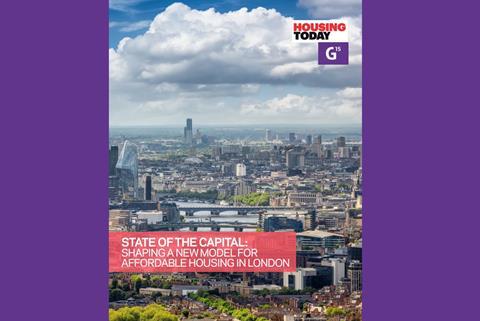Capital Letters, owned by a group of London councils, was set up to tackle homelessness but is set to shut down at the end of the year
A non-profit focused on addressing homelessness and reducing London councils’ spending on temporary accommodation is to close.
Capital Letters, which is owned by a group of London councils, said its decision to cease operation at the end of this year had been taken “with a very heavy heart” after exhausting options for financing.

Set up as a pan-London vehicle in 2019, Capital Letters initially received funding from the Ministry for Housing, Communities and Local Government, and was focused on addressing the implications of the Homeless Reduction Act 2018.
Capital Letters partners private landlords with member boroughs to lease homes for homeless families at Local Housing Allowance (LHA) rates.
Since launching it has supplied almost 6,500 homes and says it had saved taxpayers an estimated £240m.
However, the organisation’s “original success” was “stopped by rent inflation” in the capital, according to Sue Edmonds, Capital Letters chief executive.
“The impact of the post-pandemic housing crisis both in the unprecedented rise in rental prices and changes in the financial markets has made accessing affordable capital to deliver more homes for London impossible,” she said.
She said the organisation had relied on landlords letting properties at LHA rates, but that “escalating costs and opportunities to increase revenue” had resulted in rents inflating beyond this level.
Properties with rents at LHA levels now make up around 1.6% of London rental stock when LHA was designed to cover the lowest 30%, according to Edmonds.
“We have been actively pursuing funding options and new business models in order to continue to deliver our mission, but as an ethical not-for-profit organisation, the small margins we have been working with have been badly hit by uncertainty in the international markets and the cost of borrowing,” she added.
Capital Letters introduced annual membership fees from April 2023, which led to several boroughs leaving the group, leaving it with 10 council members.
Edmonds said the decision to close operations was taken “with a very heavy heart” and “in the absence of any alternative funding or income generating options” that would allow it to continue.
Capital Letters current members are Brent, Camden, Croydon, Enfield, Hackney, Harrow, Havering, Lewisham, Merton and Waltham Forest councils.
The decision comes amid mounting concern in the sector about the future of affordable housing delivery in London. Housing associations are also facing inflation, building safety costs and balance sheet capacity constraints.
Building Design’s sister title Housing Today and the G15 group of London housing associations last month published a new report, State of the Capital, recommending measures to boost affordable housing delivery in the capital. The report calls for ministers to consider introducing an amortising grant model under which associations receive a higher amount of grant per unit upfront.
This would mean the housing association initially needs to borrow much less money privately to make up the development costs, meaning net rent could more easily cover the interest costs without worsening interest cover metrics.
Over time, the association would pay back some or all of the grant interest-free to government. The advantage of this for the Treasury is that the grant paid back can be classified as an investment instead of as straightforward debt or expense to the taxpayer.
The report also calls for affordable housing to be reclassified as national infrastructure, rent convergence to be re-introduced and for social landlords to have easier access to the Building Safety Fund. It calls for government to take a holistic view of funding and rent policy, implement a joint funding pot for grant to improve existing homes and calls for national policies to take into account regional costs and skills shortages.
Housing Today and G15’s State of the Capital report

Providing new social tenancies for the 323,800 households on London’s waiting lists would inject at least an additional £7.7bn a year into London and the UK’s economy.
However, while social housing providers and ministers are both aware of the need for more affordable housing, both housing associations and the government have balance sheets constraints.
This inaugural State of the Capital report, produced by Housing Today in partnership with G15, looks at several ideas that could be adopted to help the sector build much-needed affordable housing in London during these difficult times.
The report is written by Carl Brown of Housing Today, in collaboration with the G15.
















No comments yet